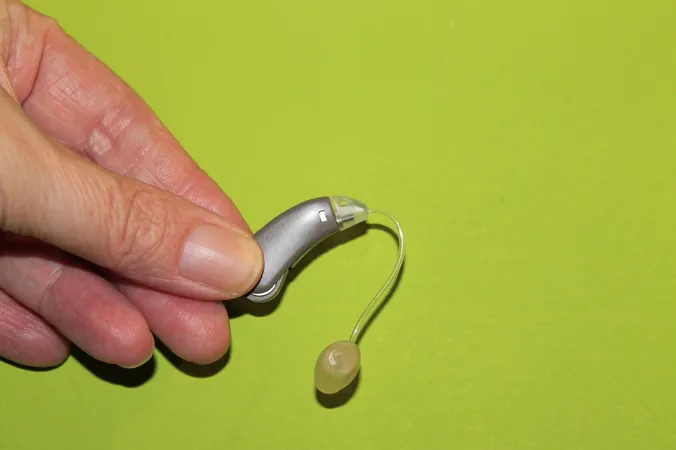
Unlocking Connections: How Better Hearing Aids Can Combat Elderly Isolation
2025-05-12
Author: Li
A Revolutionary Study on Hearing and Loneliness
A groundbreaking study reveals that providing hearing aids and expert assistance can significantly enhance social connections among the elderly, potentially alleviating the pervasive loneliness epidemic that many older Americans face.
The Stark Reality of Elderly Isolation
According to the U.S. Centers for Disease Control and Prevention, over 25% of seniors report having minimal social interactions, with one-third feeling lonely. This alarming trend has been partially attributed to hearing loss, which hampers communication and the formation of meaningful relationships.
Connecting Dots Between Hearing and Well-Being
The 2023 U.S. Surgeon General's Advisory underscores the urgency of improving social connectivity among seniors, ranking it alongside issues like tobacco addiction and obesity. Led by NYU Langone Health’s team as part of the ACHIEVE clinical trial, the recent findings show that older adults treated for hearing loss managed to maintain one extra social connection over three years compared to those who only received general guidance on healthy aging.
Quality Relationships Matter
Published in the prestigious JAMA Internal Medicine, the study noted that individuals fitted with hearing aids nurtured more diverse social networks, cultivating relationships with family, friends, and broader acquaintances. Not only did these individuals enjoy greater quantity in connections, but the quality of their bonds was also notably richer.
A Boost in Mental and Physical Health
Dr. Nicholas Reed, the lead author of the study, emphasized the importance of hearing interventions, stating, "Improving hearing in aging patients not only enriches their social lives but also enhances their overall mental and physical health." Loneliness, alongside hearing loss, poses risks like depression, heart disease, and premature mortality.
Connecting Hearing Health to Cognitive Decline
Remarkably, a 2023 report from the ACHIEVE trial found that addressing hearing issues may also slow cognitive decline in those with the highest dementia risk.
A Call to Action for Medicare Coverage
Dr. Josef Coresh, co-principal investigator of the trial, advocates for including hearing aid coverage in Medicare, framing it as a necessary step towards tackling social isolation among the elderly, whose quality of life heavily depends on sustained engagement with loved ones.
A Landmark Study with Wide Implications
This significant research enlisted nearly 1,000 seniors aged 70-84 from various U.S. states. Half received personalized hearing treatment, including hearing aids and specialized counseling, while the other half was guided in healthful aging without auditive support.
Tracking Loneliness Over Time
To measure social isolation, researchers assessed how often participants engaged socially, the variety of their networks, and the depth of their relationships. Initial assessments indicated similar loneliness levels in both groups. However, after three years, those who received hearing care reported a slight improvement in loneliness, while the other group experienced a decline.
The Cost of Hearing Care and Future Research
Hearing aids typically come with a hefty price tag, averaging $4,700 out-of-pocket expenses. Coresh stresses the importance of ongoing research, as the current subjects were predominantly white, potentially limiting broader applicability.
Exploring Further Avenues in Hearing Research
The study's researchers aim to continue tracking participants over the next three years and hope to conduct further studies with a more diverse demographic. They acknowledge that the exceptional care offered in this study significantly exceeded what is typically available to the public.
With experts like Dr. Reed, Dr. Coresh, and Dr. Frank Lin of Johns Hopkins University collaborating, the hope is that this research paves the way for essential changes in how we address hearing health and its profound impact on the elderly.



 Brasil (PT)
Brasil (PT)
 Canada (EN)
Canada (EN)
 Chile (ES)
Chile (ES)
 Česko (CS)
Česko (CS)
 대한민국 (KO)
대한민국 (KO)
 España (ES)
España (ES)
 France (FR)
France (FR)
 Hong Kong (EN)
Hong Kong (EN)
 Italia (IT)
Italia (IT)
 日本 (JA)
日本 (JA)
 Magyarország (HU)
Magyarország (HU)
 Norge (NO)
Norge (NO)
 Polska (PL)
Polska (PL)
 Schweiz (DE)
Schweiz (DE)
 Singapore (EN)
Singapore (EN)
 Sverige (SV)
Sverige (SV)
 Suomi (FI)
Suomi (FI)
 Türkiye (TR)
Türkiye (TR)
 الإمارات العربية المتحدة (AR)
الإمارات العربية المتحدة (AR)